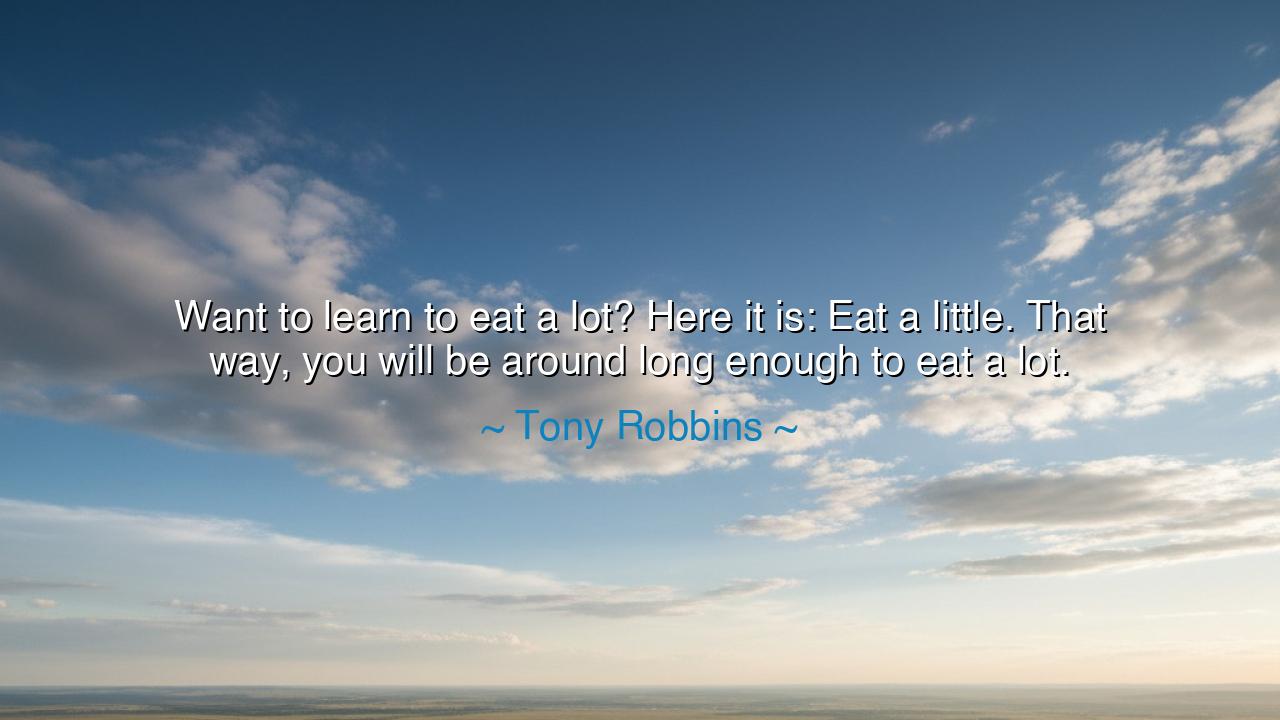
Want to learn to eat a lot? Here it is: Eat a little. That way
Want to learn to eat a lot? Here it is: Eat a little. That way, you will be around long enough to eat a lot.






“Want to learn to eat a lot? Here it is: Eat a little. That way, you will be around long enough to eat a lot.”
So speaks Tony Robbins, the teacher of energy and endurance, whose words conceal deep truth beneath their simplicity. At first, his saying appears playful — a jest upon appetite — yet within it lies a paradox of wisdom, an eternal principle known to sages and seekers alike: that moderation is the mother of abundance. What he truly teaches is not about food alone, but about the art of sustaining life, the discipline that preserves strength, and the patience that multiplies joy.
To eat a little, he says, is not deprivation, but foresight. The one who consumes all in haste leaves no feast for tomorrow; but the one who practices restraint learns to dwell in plenty for a lifetime. So it is with all things — not merely with food, but with wealth, power, and pleasure. The world belongs not to those who devour it, but to those who savor it. For excess burns the flame too quickly, while moderation keeps it alight through the long night of years. Robbins speaks to the heart of every generation enslaved by indulgence, reminding us that true satisfaction is not found in quantity, but in longevity — not in the banquet of the moment, but in the enduring feast of a well-governed life.
In ancient times, the philosopher Epicurus taught a similar law. Though often misunderstood as a lover of pleasure, he was, in truth, its most disciplined guardian. He ate bread, drank water, and rejoiced as though he had dined on kings’ fare. “If you wish to make a man rich,” he said, “do not add to his possessions, but subtract from his desires.” Like Robbins, Epicurus knew that to truly enjoy, one must first learn to limit. For when appetite becomes servant to wisdom, every morsel becomes divine.
There is power in restraint — a heroic strength born not from force, but from mastery of the self. Consider the samurai of ancient Japan, whose lives were built upon discipline so precise it became poetry. They ate sparingly, trained daily, and lived as if every breath were sacred. Their power came not from abundance, but from the harmony of body, spirit, and purpose. The warrior who feasts without thought weakens; the warrior who eats with awareness endures. Such is the spirit of Robbins’ counsel — not denial, but balance, not punishment, but preservation.
“Eat a little, so you may eat a lot.” This is the voice of wisdom calling through time, reminding us that every pleasure, if misused, devours itself. The man who seeks to live long must think not of today’s hunger, but of tomorrow’s journey. The one who lives gently upon the earth will walk it longer, and see more of its wonders. In this, Robbins speaks not of appetite alone, but of the deeper hunger within us — the hunger to live, to grow, to endure. Temperance, therefore, is not weakness but strategy, not denial but design.
In every age, humanity forgets this truth. We chase abundance through speed, comfort, and excess — yet in our haste, we shorten our own joy. Robbins’ wisdom returns us to the ancient way: the path of patience, balance, and awareness. To eat a little is to live with gratitude; to eat without end is to live without thought. He who walks the middle path — between famine and gluttony — walks in harmony with life itself.
Take, then, these teachings as your own:
-
Practice moderation in all things — for the steady flame burns the longest.
-
Honor your body — feed it not for indulgence, but for endurance.
-
Delay excess, that you may enjoy plenty through many seasons.
-
Seek balance, for in balance lies the secret of strength and joy.
Thus, remember the paradox of Tony Robbins: that by eating less, one gains more; by living simply, one lives richly. For longevity is the true banquet of life, and those who preserve their strength and wisdom shall feast upon its fullness long after the reckless have faded. So eat gently, live mindfully, and endure — that you may partake not only of the meal before you, but of the endless table of years to come.






AAdministratorAdministrator
Welcome, honored guests. Please leave a comment, we will respond soon